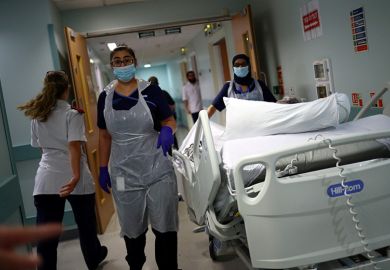Petford: ‘universities, at the end of the day, are businesses’
UK universities will soon be charging Britons £20,000 a year as the sector begins to think about home students in the same way that it does those from overseas, a vice-chancellor has argued.
“Some universities in the UK that have a high brand value will be able to charge £17,000, £18,000 or £20,000 a year in the future – I am sure of that,” said Nick Petford, vice-chancellor of the University of Northampton, in a Times Higher Education podcast this week.
“If you look at international students, that’s been a pretty much unregulated market since we’ve been recruiting overseas students. Universities have always been used to this sort of behaviour.
“The big step change now is thinking about home students in this way.”
According to Professor Petford, politicians were “naive” to expect different institutions to charge a range of fees when the cap was raised to £9,000 a year from 2012.
He argued that it was always likely that they would congregate around a “sweet spot” towards the upper end of the scale.
“I think that was inevitable,” he said. The risk for institutions now, he continued, was that because the cap prevents them from increasing fees in line with inflation, they could soon find themselves short of cash.
“It’s quite easy to do a financial forecast which shows that if the cap remains at £9,000 in the next decade, a number of universities – including ours – could potentially be in financial difficulty. Something has to give at some stage.”
But tackling the shortfall will not be easy, Professor Petford said: “The problem is that no political party is going to go into the next election saying: ‘We’re going to make it more expensive to go to university.’ As a vote winner, it’s just not going to work, is it?”
Hanging tough
Elsewhere in the podcast, Professor Petford spoke candidly about the tough decisions vice-chancellors have to make when restructuring their institutions.
In August 2011, he was accused of “dismissing” the work of administrative and support staff after redundancy plans were announced, while earlier this year the Northampton branch of the University and College Union passed a motion of no confidence in a restructuring exercise that it said had caused needless anxiety.
“You do have to make difficult decisions as a vice-chancellor because universities, at the end of the day, are businesses,” said Professor Petford. The recent increases in energy prices illustrate well the financial battles that institutions have to fight, he continued.
“I have just been talking to new staff at the university and one of the questions I like to ask them is: ‘How much do you think it costs to heat and light a university every year?’
“For one of our size, it is nearly £2 million – which is going up 10 per cent year on year. Where does that money come from? It doesn’t come from a cheque from the government…it ultimately comes from student fees.”
The “heady mix of commercialism and marketisation” that has taken root in the academy meant that “you do, as a vice-chancellor, have to make quite tough decisions about staffing”, he added.
Register to continue
Why register?
- Registration is free and only takes a moment
- Once registered, you can read 3 articles a month
- Sign up for our newsletter
Subscribe
Or subscribe for unlimited access to:
- Unlimited access to news, views, insights & reviews
- Digital editions
- Digital access to THE’s university and college rankings analysis
Already registered or a current subscriber?




